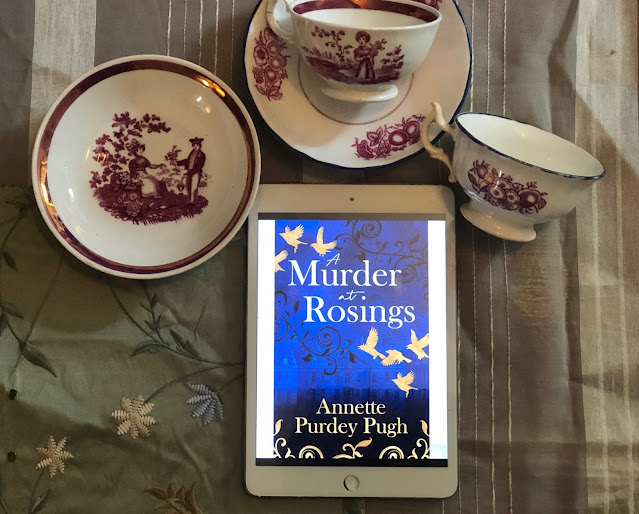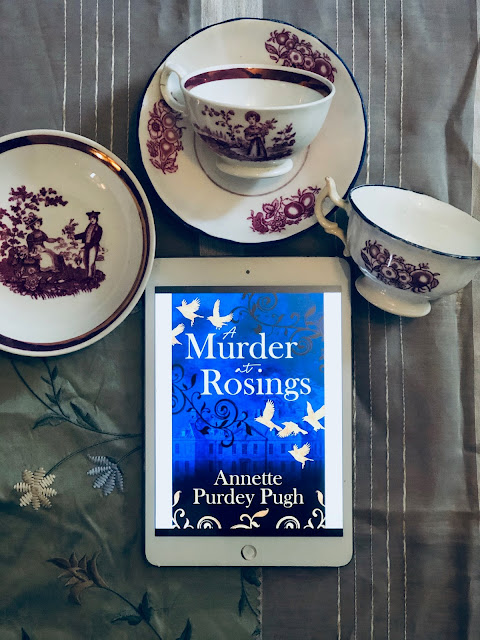"You will ride with me to Rosings, immediately. There has been terrible mischief afoot there and I need my constable to assist me".
"We won't be safe in our beds, not with a murderer on the loose. And to think it's happened at Rosings, of all places!"
A Murder at Rosings by Annette Purdey Pugh is an engaging and entertaining Austenesque murder mystery. This is a sequel to Pride and Prejudice, set a few years later after the wedding of Elizabeth and Mr Darcy (who are barely mentioned in this book).
This sequel is historically accurate, and is written in the Regency literature style, without any glaring period language errors.
The book begins with the old gardener at Rosings observing his domain, when he hears loud summons from his mistress, the one and only Lady Catherine. Near the coleus bed they find a shape among the plants. His black clerical garb is unmistakeable. This is Mr Collins, dead. He has a knife in his chest.
The magistarate is sent for without delay. Sir John Bright is the local magistrate, who has appointed Robert Archer to the post of the village constable. Archer is a wheelwright, he is young, but he has made a thriving business for himself, and is well respected in the village. As Sir John says, "His strength and level humour stand him in good stead when dealing with lawbreakers".
Sir John intends to use the modern methods of investigation and questioning, meaning he is going to talk to all the household members to gather information to complete the entire picture.
The murder is quite perplexing. "It has neither rhyme nor reason. If it were not for the weapon, I should be content to conclude that Mr Collins was the unfortunate victim of some random felon, now escaped". However, Mr Collins has been killed with a paper knife which has the de Bourgh family crest upon it.
Who is the murderer? And why was Mr Collins slayed in the garden? It is clearly not because "his sermons were too long".
Mr Bennet and his daughter Mary are staying at the Collinses, while Mrs Bennet is attending the confinement of one of her daughters.
During the investigation it becomes obvious that Mr Bennet and Mr Collins have had a few heated arguments. If you've read P&P, you know that Mr Collins was the heir to Mr Bennet's estate, which was entailed to the male line only. This has caused a rift between the two families. Now that Mr Collins is dead, Mr Bennet may find his family's future restored.
Mr Bennet's predicament is serious indeed, as he becomes the principal suspect.
Mary uncovers a scandalous secret that may well hold a big clue as to why Mr Collins was murdered.
Will she be able to solve the mystery and prove her father's innocence before he is sent to the gallows?
A Murder at Rosings is a satisfying and diverting homage to Pride and Prejudice.
This is not the first book, where Mary, the overlooked middle Bennet girl with less charisma or talent than the other sisters, takes a leading part. Just last year Mary's life was re-imagined in The Other Bennet Sister. And Charlotte Lucas's life has been re-explored by Helen Moffett in Charlotte.
"Mary had, for all her life, been compared unfavourably with her sisters. She had neither Jane's beauty, not Lizzy's clever tongue, while her younger sisters' animation made her seem dull indeed. She had accepted at an early age that she was destined to be overlooked, and any attempts to put herself forward were generally not welcomed".
So, Mary devotes her life to studies. Greek is her passion, and she is teaching herself the ancient language. Mr Bennet, as usual, makes fun of her studies. When she is reluctant to travel to Huntsford, content with the company of books, he remarks, "I must insist you come to Huntsford this time, Greek has been with us for thousands of years so far, and I assure you it will not disappear if you leave it alone for a week or two more".
Unlike her family, she is inclined to be of a kinder opinion of Mr Collins, and appreciates his help. She considers him to be most patient and kind (it shows how neglectful her own family is, if she finds Mr Collins accommodating and good company). Her opinion of Mr Collins will change as the story develops.
The characters stay reasonably faithful to the originals, apart from maybe Lady Catherine. She is portrayed as a benevolent mistress who takes care of her servants (i.e. makes their living quarters more comfortable etc). In real life, I doubt that the likes of her would take notice of the sleeping arrangements of their bootboys.
Mr Collins, for whom the word pompous was invented, has been derided enough, without making him even more unpleasant.
My first thoughts were, Oh No, poor Charlotte with three little children, how is she going to cope now, with no income of her own?! Mr Collins was a pain in the neck, and one of the most unpleasant characters in all Austen's books, but he would have cared for his wife and provided her with all possible comforts, suitable for his status and position in life.
A Murder at Rosings is a novel about skeletons in the cupboard, family, loyalty and friendship.
Many thanks to Annette Purdey Pugh and NetGalley for my e-copy of the book!



No comments:
Post a Comment